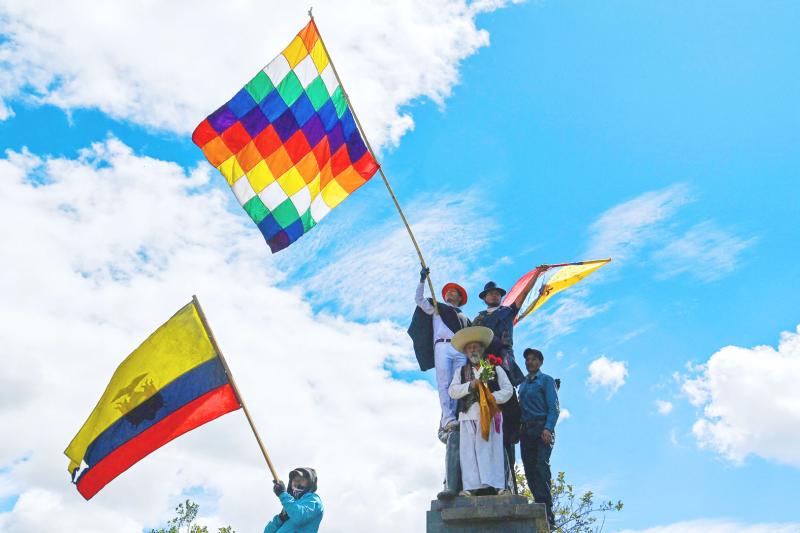Thousands of indigenous protesters on Thursday evening left the Ecuadoran capital after their leaders and the government signed a deal that would cut fuel prices and end their cost-of-living demonstrations that largely paralyzed the country for 18 straight days.
The agreement, mediated by the Catholic Church and signed in Quito, provides for a US$0.05 per gallon reduction in the price of diesel and gasoline on top of a US$0.10 cut already conceded by the government.
“Very likely we are tired ... so it’s time to go home,” protest leader Leonidas Iza told a crowd of about 4,000 demonstrators after announcing an end to the protests earlier in the day.

Photo: AFP
The protesters funneled out of the city peacefully in buses and trucks, many of them waving Ecuadoran and indigenous multi-color Wiphala flags.
Ecuadoran President Guillermo Lasso, for his part, wrote on Twitter that the parties had achieved “the supreme value to which we all aspire: peace in our country.”
Later, in a radio and television broadcast, he said it was “time to heal wounds, to overcome the division between Ecuadorians and unite in a single objective: to rebuild Ecuador.”
Fast-rising fuel prices were the catalyst for the protests called by the Confederation of Indigenous Nationalities (CONAIE) and marked by burning roadblocks and sometimes violent clashes with the security forces.
Five civilians and a soldier have died since the protests started on June 13, hundreds were injured on both sides, and about 150 people have been arrested.
Signed by CONAIE leader Iza and Ecuadoran Minister of Government Francisco Jimenez, the agreement foresees further negotiations between the two sides, an end to the disruptive roadblocks erected countrywide, and the lifting of a state of emergency in four of Ecuador’s 24 provinces.
The deal would also provide for a review of government decrees on oil exploitation and mining in Indigenous lands.
An estimated 14,000 Ecuadorans — most of them in Quito — took part in the mass show of discontent against deepening hardship in an economy dealt a serious blow by the COVID-19 pandemic.
Thursday’s agreement provides for “the cessation of the mobilizations and the gradual return [of the demonstrators] to the territories” where they came from to join the protest.
In a statement, the UN office in Ecuador welcomed the protests’ end, and indicated that guarantees of peace were essential in “addressing polarization and exclusion, and in moving towards reconciliation.”

A new online voting system aimed at boosting turnout among the Philippines’ millions of overseas workers ahead of Monday’s mid-term elections has been marked by confusion and fears of disenfranchisement. Thousands of overseas Filipino workers have already cast their ballots in the race dominated by a bitter feud between President Ferdinand Marcos Jr and his impeached vice president, Sara Duterte. While official turnout figures are not yet publicly available, data from the Philippine Commission on Elections (COMELEC) showed that at least 134,000 of the 1.22 million registered overseas voters have signed up for the new online system, which opened on April 13. However,

ALLIES: Calling Putin his ‘old friend,’ Xi said Beijing stood alongside Russia ‘in the face of the international counter-current of unilateralism and hegemonic bullying’ Chinese President Xi Jinping (習近平) yesterday was in Moscow for a state visit ahead of the Kremlin’s grand Victory Day celebrations, as Ukraine accused Russia’s army of launching air strikes just hours into a supposed truce. More than 20 foreign leaders were in Russia to attend a vast military parade today marking 80 years since the defeat of Nazi Germany in World War II, taking place three years into Russia’s offensive in Ukraine. Putin ordered troops into Ukraine in February 2022 and has marshaled the memory of Soviet victory against Nazi Germany to justify his campaign and rally society behind the offensive,

ENTERTAINMENT: Rio officials have a history of organizing massive concerts on Copacabana Beach, with Madonna’s show drawing about 1.6 million fans last year Lady Gaga on Saturday night gave a free concert in front of 2 million fans who poured onto Copacabana Beach in Rio de Janeiro for the biggest show of her career. “Tonight, we’re making history... Thank you for making history with me,” Lady Gaga told a screaming crowd. The Mother Monster, as she is known, started the show at about 10:10pm local time with her 2011 song Bloody Mary. Cries of joy rose from the tightly packed fans who sang and danced shoulder-to-shoulder on the vast stretch of sand. Concert organizers said 2.1 million people attended the show. Lady Gaga

CONFLICTING REPORTS: Beijing said it was ‘not familiar with the matter’ when asked if Chinese jets were used in the conflict, after Pakistan’s foreign minister said they were The Pakistan Army yesterday said it shot down 25 Indian drones, a day after the worst violence between the nuclear-armed rivals in two decades. Pakistani Prime Minister Shehbaz Sharif vowed to retaliate after India launched deadly missile strikes on Wednesday morning, escalating days of gunfire along their border. At least 45 deaths were reported from both sides following Wednesday’s violence, including children. Pakistan’s military said in a statement yesterday that it had “so far shot down 25 Israeli-made Harop drones” at multiple location across the country. “Last night, India showed another act of aggression by sending drones to multiple locations,” Pakistan military spokesman Ahmed